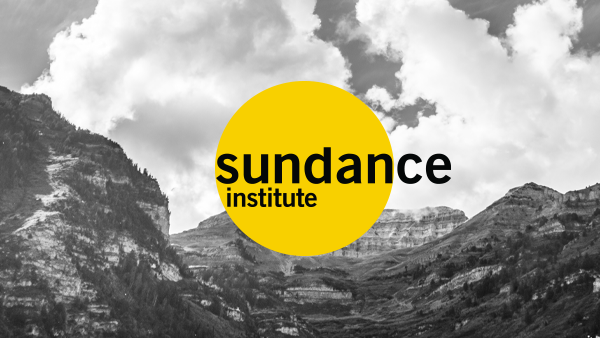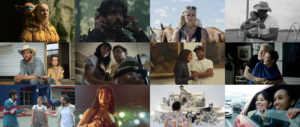Sundance Institute
In the week before the masses arrived in Park City for this year’s Sundance Film Festival, a more intimate gathering was held in the snowy mountains that are home to the Sundance Resort: our annual January Screenwriters Lab.
Fifteen fellows came together with sixteen creative advisors to dig into their feature screenplays and explore issues of craft, storytelling, and communicating personal vision. In the process, a deep sense of creative revitalization and community was shared by all.
The fellows were Liliana Greenfield-Sanders (Adelaide), Holden Abigail Osborne (Adelyne), Jody Lee Lipes and Jeffrey Peixoto (Confederacy), Najwa Najjar (Eyes of a Thief), Malik Vitthal and Ismet Prcic (Imperial Dreams), Seng Tat Liew (In What City Does It Live?), Yolanda Cruz (La Raya), Sara Colangelo (Little Accidents), Carlo Mirabella-Davis (On Evil), Yaelle Kayam (Providence), Diane Bell (Stem), and Ian Olds and Paul Felten (The Western Habit).
Creative advisors were led by artistic director Scott Frank, and included Naomi Foner, Susannah Grant, John Lee Hancock, Kasi Lemmons, Fernando Leon de Aranoa, Malia Scotch Marmo, Jessie Nelson, Scott Neustadter, Howard Rodman, Ira Sachs, Jennifer Salt, Susan Shilliday, Zach Sklar, Elena Soarez, and Tyger Williams.
After a week spent at the January Screenwriters Lab developing their project The Western Habit, Fellows Ian Olds and Paul Felten sat down to talk about their experience.
What did you expect from the experience?
Ian Olds: I expected it to be intense, but I didn’t know in what way. I knew there would be no writing during the week and the core of the Lab would be centered around long one-on-one story meetings with Advisors. So, my feeling going in was, “Okay, I know it’s supposed to be intense, but how tough can it really be to sit around talking about a screenplay?”
Then we had our first meeting. I came out in a daze and ran into another Fellow, her eyes gleaming, “I’ve already wept! I just had my script blown wide open and it was amazing!” So basically I think we were all quickly disabused of any notion we had that this was going to be a casual conversation about writing.
Paul Felten: My worry about the lab early on was that a particular ethos was going to be sold too hard—an ethos that asked us to crowbar all the messy humanity that my favorite movies evoke into something conventional and (God help us all) appropriate.
That worry turned out to be unfounded, as did my other, which was that the experience would approximate the workshop classes I had in grad school. The Advisors insist on a sort of collaborative huddle that feels far from the classroom. I was told to expect confusion and sleeplessness, so when these things came I wasn’t surprised. I was told that people cry, but I didn’t. Did you? In private? Be honest.
Ian: Well, there was much wailing and gnashing of teeth, I’ll admit that…
What was the most surprising aspect of the advisor meetings?
Paul: A very particular kind of candor. The advisors only know you through your writing, and the screenplay is all we both have to go on. They’re genuinely interpreting your script, as any real peer would, and because all responsible interpretation begins with a series of questions provoked by an intuitive response to the work at hand, they come at you hard with those. It’s much harder to answer questions than it is to listen to praise or “constructive criticism.”
Ian: I think the thing that surprised me most was how quickly the conversations turned from the mechanics of writing to something much deeper. A tone was set very early on that makes it clear that this is an opportunity to try and get at something buried at the heart of your work. You could resist that impulse, hang back at a safe distance and just take a few relevant pointers, but the engagement from the advisors is so immediate, so committed, that it was impossible not to feel the urge to dive in and go as deep as you could. And it’s a two-way street, it quickly became apparent that this is a powerful experience for the Advisors as well as the Fellows. As one advisor said, “I keep coming back because this is the one place that won’t let me get away with my shit, won’t let me get away with just good enough.”
Paul: Yeah, the advisors reveal as much about themselves as we do over the course of the meetings. They’re not just telling you how they think you should fix your script, they’re telling you what their own deep concerns are when they sit down to write, how much nuance and complexity they think the form can bear.
How do you navigate the advisors’ differing responses to your script, especially since they’re coming at you so fast?
Paul: Our sense of what we wrote—o f what we managed to convey—inevitably changed over the course of our conversations, and I had genuine answers on the second day to questions that just made me stammer on the first. I listened, I took notes, I tried my damndest not to get too drunk on any one idea just because it sounded good then and there. I came away feeling like our script as it stands now suggests a number of possibilities—some more intuitively interesting to us than others.
Ian: I just tried to take it all in and not freak out. And actually, it was pretty fun. We’d come up with something in one meeting and try to develop it in the next. But in the back of my mind the thing that kept me sane was that I knew eventually it would just be Paul and I in a room making decisions. Regardless of the temporary confusion the Lab engenders, I have total faith that we know what’s right for our film. So in that light, all the varying feedback feels like perspective as opposed to criticism.
Do you feel like the process encourages one to make a certain kind of film?
Ian: No. Although we went into the experience fully aware of the criticism from some quarters that there is a particular ‘Sundance model,’ ultimately the answer to that question is no. I left the Lab reminded of the fact that it’s hard as hell to make a great film. As much as the Lab challenges your assumptions of your own work, it is 100% clear that you’re the one who has to make the right creative decisions to serve your film. If we make a mediocre choice to solve a real problem, that’s on us, not the Lab.
Paul: Our script is rather irreverent, and occasionally Advisors encouraged us to imagine its more earnest counterpart. I think they did this because they wanted us to see everyone in our story from every possible angle—not because they wanted to watch yet another earnest indie drama with tears trickling down cheeks to the strains of softly-strummed guitars. A thought experiment –not an aesthetic mandate—that forces us to go deeper. Again, it’s our own fault if we come up with unimaginative or dishonest solutions to the problems at hand.
What was the effect of the Lab process on your script?
Paul: Ask me next week. Six smart people said true things, some of which contradict one another. Plus there’s you, Ian. A surfeit of riches, a pain in the ass.
Ian: I second that. We’ll have to wait and see what the rewrite looks like. But that said, one thing I know for certain is that if we hadn’t taken our project through the Lab we would have spent a long, long time fiddling with the edges of our script. We knew going in we had problems that we wanted to solve, but kept thinking of solutions in terms of tweaking certain scenes or character movements. The Lab process shook us up, made us want to engage our deep concerns as writers and helped us see beyond a superficial approach to the rewrite.
Paul: We needed it. It can be easy for us to go in circles together. The Lab threw us off a cliff.
What was the best advice you got at the Lab?
Ian: Share what you know.
Paul: That’s right. Don’t just investigate human beings, share what you know about them. Simple as it sounds, there’s something risky and frightening about the deep work that edict demands of us. And someone told us to go write in Northern California, where our script takes place. That’s our next trip.




